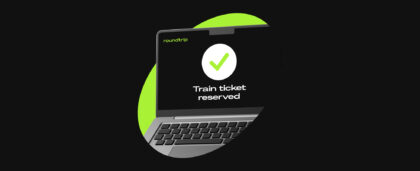Content
- Passport and visa essentials
- ETIAS for U.S. citizens traveling to Germany
- What ETIAS means for american travelers
- Practical tips for preparing for corporate travel to Germany
- Travel insurance & healthcare considerations
- What to expect upon arrival in Germany
- Booking your corporate travel in Germany with ease
Passport and visa essentials
The first step to ensuring any business trip is successful is to keep all travel documents in order. For Germany, “travel documents” will primarily include a passport and, depending on nationality, possibly a visa.
Passport requirements
A passport is the key to entry. Access will likely be denied if a valid passport is not presented. Germany is one of the 29 EU countries a part of the Schengen Area, meaning border patrol enforces Schengen EU laws, which require:
- Validity: The passport must be valid for at least three months beyond the planned departure from the Schengen Zone. Ideally, ensure it has six months’ validity to avoid unexpected issues.
- Condition: The passport should be in good physical condition; damaged documents may be rejected.
- Biometric passports: Holders of biometric passports can often take advantage of e-gates at major German airports, which can speed up processing times.
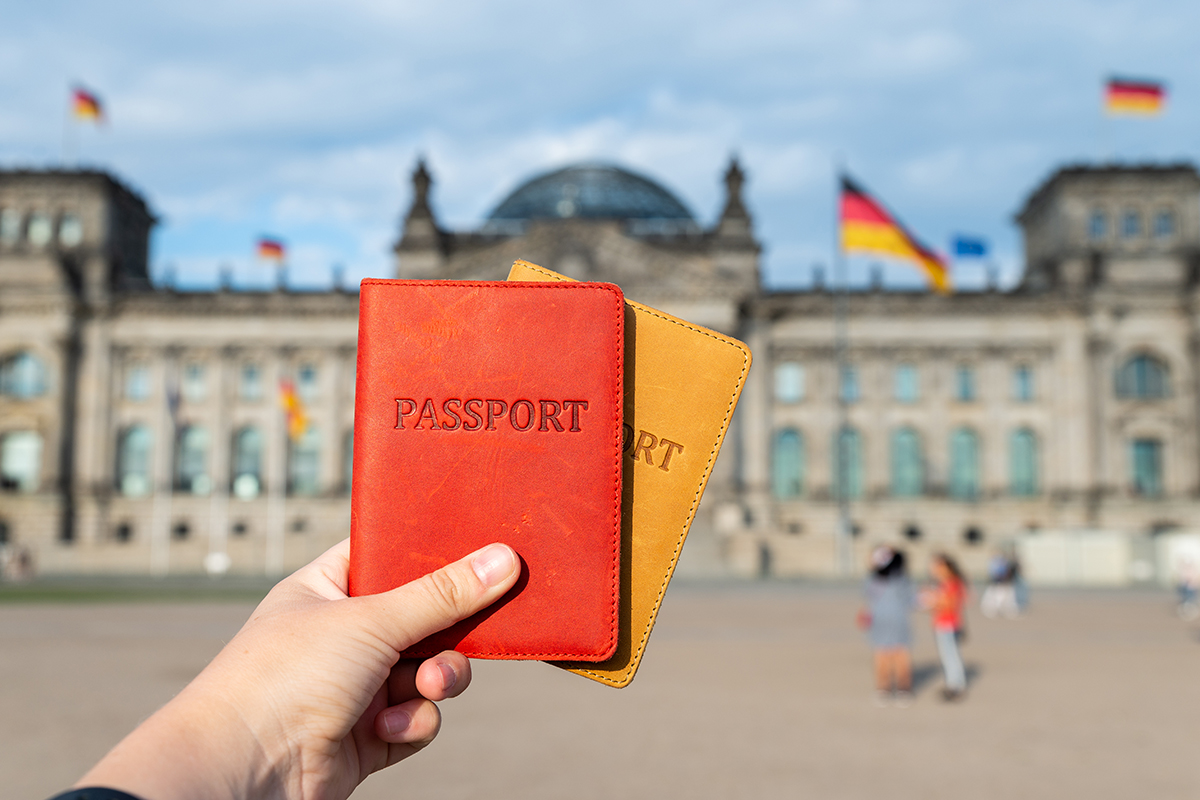
The passport must be valid for at least three months beyond the planned departure from the Schengen Zone.
Photo by Yuliia Myroniuk on Shutterstock
Visa requirements
Since Germany is part of the Schengen Area, travelers are allowed free movement between 29 European countries. Whether a visa is needed depends on nationality and the duration of stay:
- Visa-exempt travelers: Citizens of the EU, EEA, Switzerland, the U.S., Canada, Japan, Australia, and many other countries do not need a visa for short business visits (up to 90 days in a 180-day period).
- Visa-required travelers: Those from countries not on the visa-exempt list must apply for a Schengen short-stay visa (Type C).
Documents typically required for a business visa application include:
- Completed visa application form
- Valid passport with sufficient validity
- Passport-sized photographs
- Invitation letter from a German business partner or company
- Proof of travel itinerary (flight and accommodation bookings)
- Evidence of financial means to cover expenses
- Travel health insurance covering at least €30,000
If a stay is going to exceed the 90-day limit or if employment in Germany is planned, it is necessary to apply for and receive a national visa (Type D) and a residence permit. These must be obtained from the German Embassy before the 90-day mark or the start of any employment.
ETIAS for U.S. citizens traveling to Germany
Just like many other countries, citizens of the United States can currently enjoy a visa-free entry to Germany and the rest of the Schengen Area for upwards of 90 days within a 180-day period. This permits American business travelers to attend meetings, conferences, and events without having to go through any visa trouble.
However, starting in 2026, U.S. citizens will need to complete a new registration process under the European Travel Information and Authorization System (ETIAS) before traveling. ETIAS is not a visa but a security pre-screening measure designed to enhance border management and safety across Europe.
What ETIAS means for american travelers
U.S. citizens can continue to travel to Germany without a visa for up to 90 days. However, beginning in 2026, a mandatory ETIAS authorization will be required before boarding a flight to Germany or any other Schengen country. Once approved, ETIAS will typically be valid for three years (or until the passport expires, whichever comes first).
The good news is that the EITAS application process is fairly simple. There is an easy-to-access online form that will ask for passport details, travel history, and background information. Most applications are expected to be approved within minutes, though some may take up to 96 hours. There is a small processing fee that applies to applicants aged 18–70.
You may also be interested in: Italy Business Entry: Visa and Compliance Guidelines for Corporate Travelers
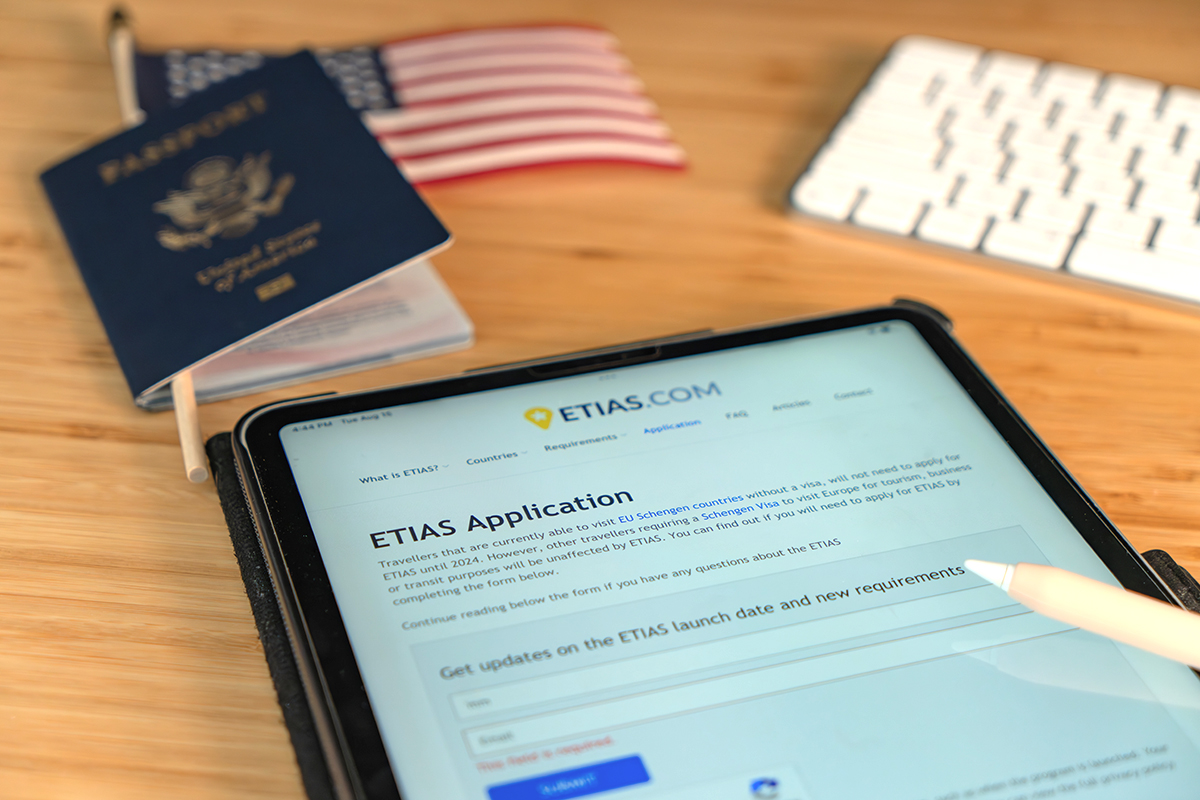
Just like many other countries, citizens of the United States can currently enjoy a visa-free entry to Germany.
Photo by Evgenia Parajanian on Shutterstock
Practical tips for preparing for corporate travel to Germany
Once the essentials are in place, the next step is to prepare for the practical aspects of the trip. Getting everything together and organized ahead of time can save valuable time and reduce corporate travel stress, allowing for a focus on business goals.
Organizing documents
Carry both digital and paper copies of:
- Passport and visa
- Invitation letter
- Travel and hotel confirmations
- Health and travel insurance policy
- Meeting schedules
Storing digital copies in secure cloud storage ensures they are accessible in case of loss or theft.
Connectivity and technology
Staying connected during a visit is important. Germany uses 230V electricity with Type C and F plugs, so an adapter may be needed depending on the country of origin and the location of stay. Since adapters are fairly inexpensive, carrying one just in case is suggested.
Wi-Fi is widely available in hotels, conference centers, and coffee shops. However, for uninterrupted access to data, consider an international data plan or a local SIM card.
Mobile payments are accepted across Germany, but it is wise to have a physical card on hand, as some stores or hotels may require them. Having euros available is also advisable in case any issues arise with using cards internationally.
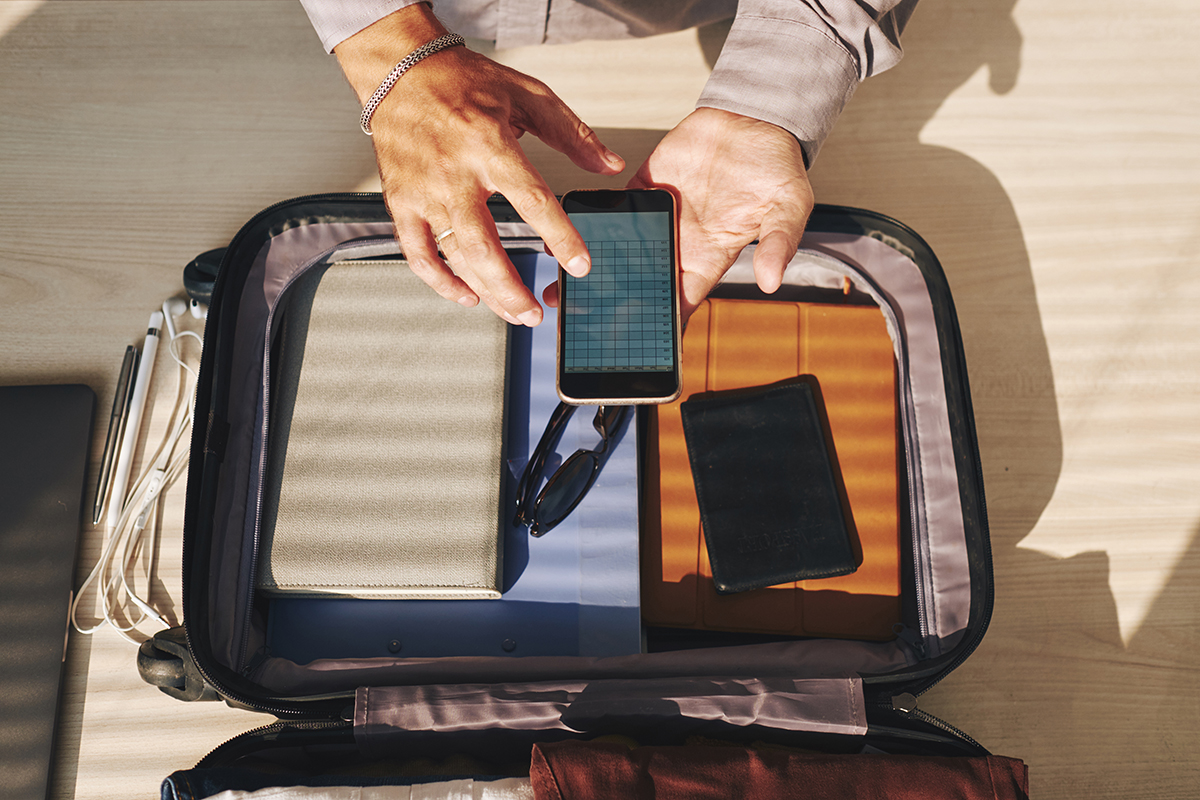
If you want uninterrupted access to data, consider an international data plan or a local SIM card.
Photo by pressfoto on Freepik
Transportation
Germany has a world-class public transportation system, making maneuvering effortless (or as effortless as travel can be). Here is a breakdown of transportation options in Germany:
- Trains: Deutsche Bahn offers fast and efficient intercity connections. Business travelers can use ICE (InterCity Express) trains to move quickly between cities.
- Local transport: Metro systems in cities like Berlin and Munich are reliable and punctual.
- Taxis and ride-hailing: Widely available, though booking in advance for airport transfers is wise.
- Driving: Renting a car is an option, but German cities often have strict parking rules and environmental zones. Public transport is usually the faster choice.
Travel insurance & healthcare considerations
Travel insurance and healthcare are critical considerations when planning a corporate trip. Understanding these components and preparing properly can eliminate a lot of stress if something were to arise.
Travel insurance
Even if a visa is not required, travel insurance is highly recommended. The plan should be comprehensive and cover:
- Emergency medical expenses
- Trip cancellations and interruptions
- Lost luggage and valuables
- Delays or missed connections
For Schengen visa applicants, proof of insurance covering at least €30,000 in medical expenses is mandatory.
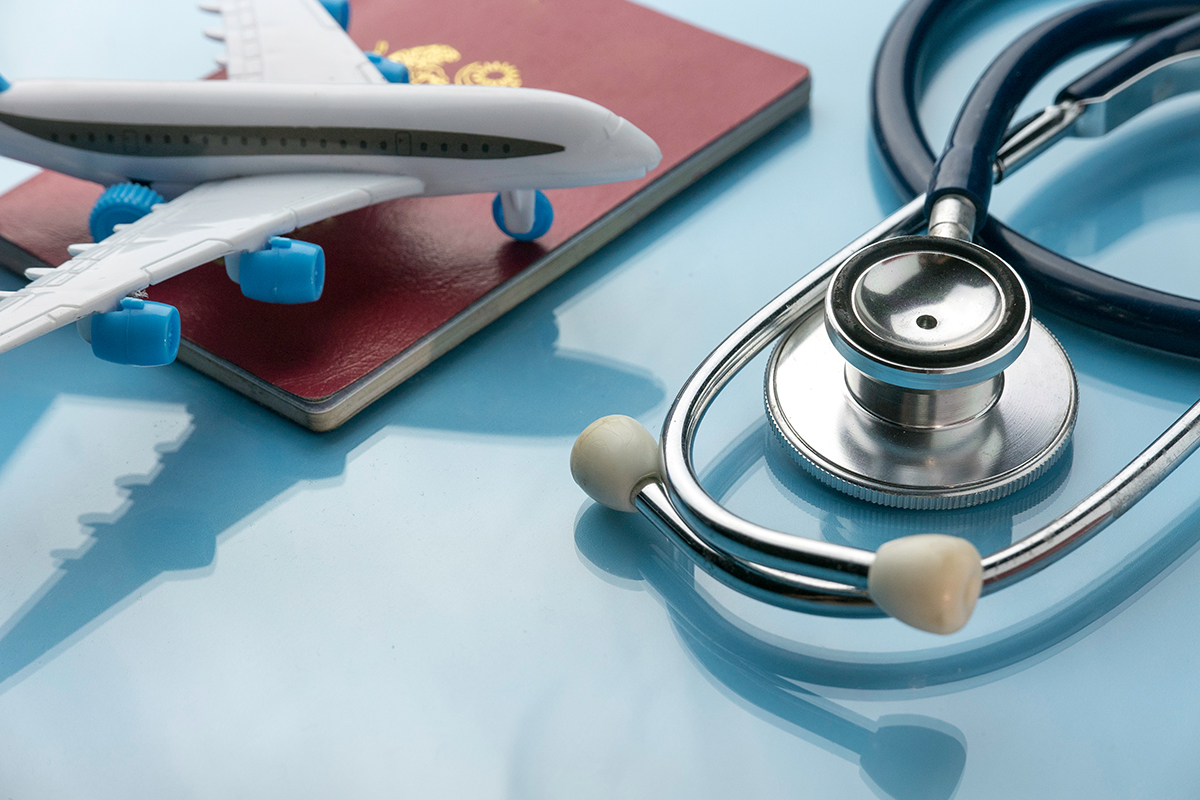
Travel insurance and healthcare are critical considerations when planning a corporate trip.
Photo by Faizal Ramli on Shutterstock
Healthcare in Germany
Germany has a great healthcare system, which can be accessed by travelers if needed. Take a look at these points for business travelers:
- EU/EEA citizens can use the European Health Insurance Card (EHIC) to access necessary medical care.
- Non-EU travelers should have private travel health insurance. Medical care without coverage can be costly.
- Prescriptions: Bring medications in original packaging with your name on the label. Research beforehand, as some medications may have restrictions in Germany.
Vaccinations
No special vaccinations are required for Germany, but routine immunizations (influenza, tetanus, measles) should be up to date. During the winter months, the flu vaccine is highly recommended for travelers attending large gatherings.
What to expect upon arrival in Germany
Upon landing in Germany, what can be expected? Understanding the arrival procedures can help navigate airports, customs, and immigration smoothly and with confidence.
Immigration and border control
This is where the organization really comes in handy. Upon landing, it is necessary to present the following documents:
- A valid passport
- Visa (if applicable)
- Invitation letter or proof of business purpose
- Hotel booking or accommodation details
Border officers may ask questions about the trip’s purpose and duration. Keep documents accessible to avoid delays.
Customs regulations
Another set of regulations to be prepared for is customs. It is important to know that any amounts over €10,000 must be declared at customs. And while laptops and reasonable promotional items are generally fine, larger shipments of samples or goods may require special customs procedures.
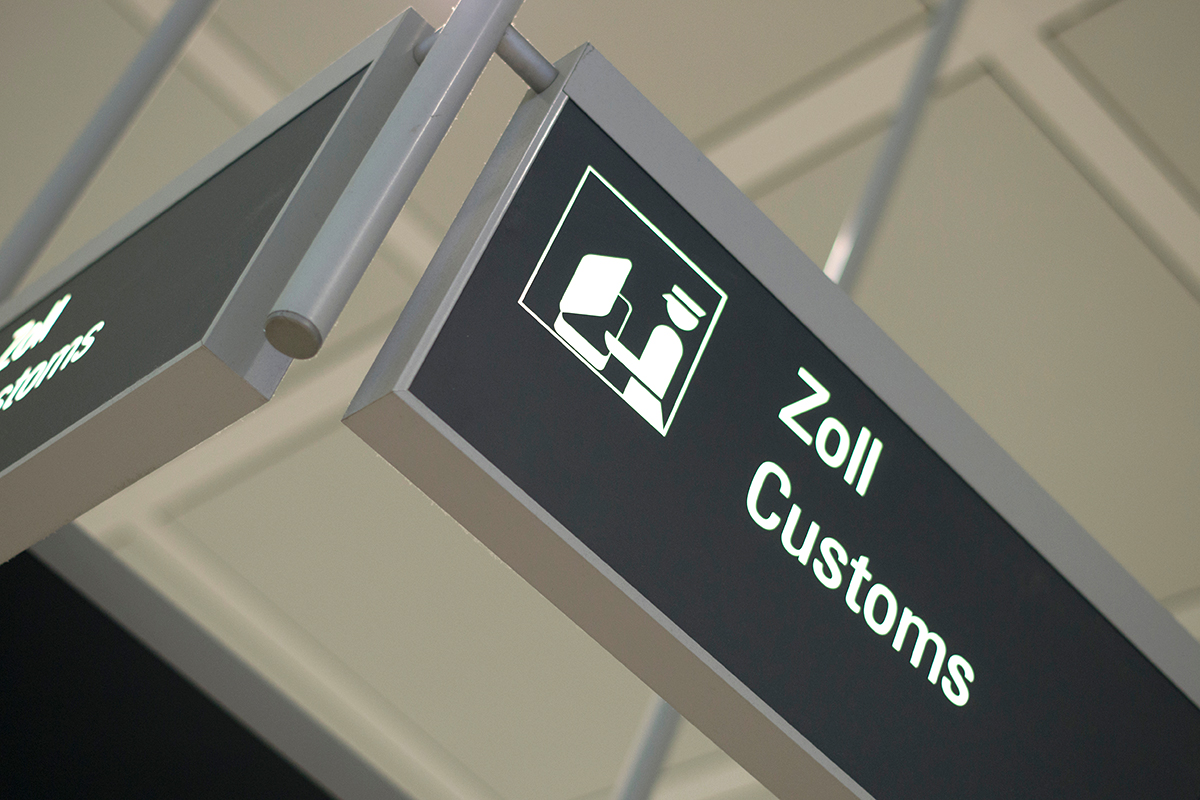
Another set of regulations to be prepared for is customs.
Photo by Pradeep Thomas Thundiyil on Shutterstock
Accommodation
Business travelers often prefer hotels close to city centers or business districts. With the help of a corporate travel booking platform, they can get access to Germany’s best hotels with amenities like:
- Conference facilities
- Business lounges
- High-speed internet
- Express check-in/out
Booking your corporate travel in Germany with ease
Corporate travel to Germany offers immense opportunities in one of the most influential economies in the world. By preparing properly—ensuring passports and visas are in order, arranging insurance, and understanding what to expect upon arrival—travelers can set themselves up for a smooth and successful trip.
If you’re ready to plan a corporate trip to Germany, use Roundtrip, a renowned corporate travel booking platform. Explore over 2.9 million hotels and exclusive rates to find the best airfare and accommodation options near your meetings and conferences.
Cover: Photo by wirestock on Freepik



